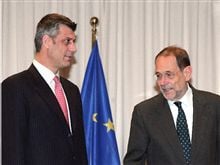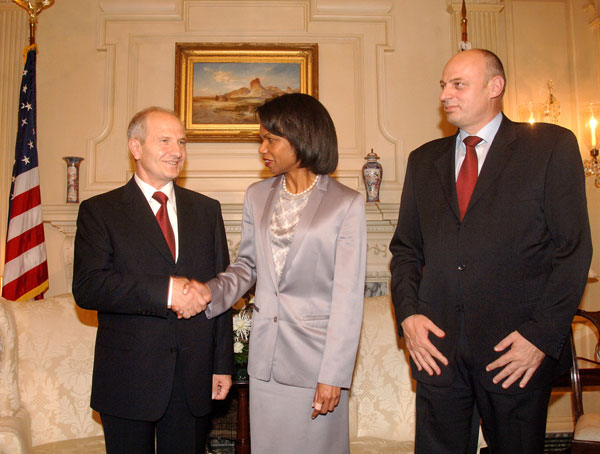Kosovo: The US and the EU support a Political Process linked to Organized Crime Kosovo Prime Minister Hashim Thaci is part of a criminal syndicate by Michel Chossudovsky | |
Global Research, February 12, 2008 | |
US-NATO covert support the KLA, goes back to the mid-1990s. Iin the year preceding the 1999 bombing of Yugoslavia, the KLA was quite openly supported by the Clinton administration. KLA leader Hashim Thaci was a protégé of Madeleine Albright. He was chosen by Albright to play a key role on Washington's behalf at the 1998 Rambouillet negotiations. .
The Christian Science Monitor in an August 14, 2000 report describes the criminal network controlled by Thaci:
The Heritage Foundation: Support the KLA-KDP, despite its Criminal Connections The Heritage Foundation in a May 1999 report acknowledges that the KLA is a criminal organization. It nonetheless called for the support of the KLA should by the Clinton administration:
The Heritage Foundation supports the Kosovo Democratic Party (KDP) which is integrated by former members of the KLA. Hashim Thaci
A known criminal is being protected by the United Nations: He was arrested in Budapest in July 2003 on an Interpol warrant and was immediately released, following a request from the UN Mission in Kosovo (UNMIK). This is not an isolated event. There is evidence that the UN Mission and its international police force have protected the former KLA, which in the wake of the 1999 NATO bombing was relabeled the Kosovo Protection Corps (KPC) under a formal UN mandate. According to Serbian Justice Minister Vladan Batic, "the prosecution at the Hague war crimes tribunal has over 40,000 pages of evidence against former Kosovo Liberation Army leader Hashim Thaci, (quoted by Radio B92, Belgrade, 3 July 2003). In April 2000, US Secretary of State Madeleine Albright "ordered The Hague chief prosecutor Carla del Ponte to omit from the list of war crime suspects Hashim Thaci" (Tanjug, 6 May 2000). Carla del Ponte subsequently claimed that there was not enough evidence to indict Thaci on war crimes. . More generally, the UN Mission has acted as an accessory in protecting a criminal syndicate. In November 2003, criminal proceedings against several former KLA commanders were initiated in Belgrade. These included Hashim Thaci, Agim Ceku and Ramush Haradinaj. .Both Haradinaj and Ceku's names are on Interpol lists. Agim Ceku Agim Ceku is known for having committed extensive war crimes in the Krajina region of Croatia in the mid-1990s involving the massacre and ethnic cleansing of the Serb population. He was a former brigadier general in the Croatian Army and a key planner of Operation Storm, which led to the expulsion of several hundred thousand Serbs from Krajina region of Croatia. In 1999, he was appointed Commander of the KLA, with the approval of the US and NATO. He was subsequently appointed Commander of the UN sponsored Kosovo Protection Corps (KPC) (on a UN payroll) and became Prime Minister of Kosovo in 2006, succeeded by Hashim Thaci, the current Prime Minister In Kosovo, he has continues to have links to organized crime syndicates. According to a London Observer, the KPC which was headed by Ceku, was involved in acts of torture as well protecting prostitution in Kosovo. (March 14, 2000 , Atlanta Journal-Constitution)
From Left to right: Hashim Thaci, Bernard Jouchner, General Michael Jackson, Agim Ceku, General Wesley Clarke
The Kosovo government is tied into organized criminal syndicates involved in narcotics and human trafficking. The fact that all three Kosovo Prime Ministers, Ramush Haradinaj, Agim Ceku and Hashim Thaci are war criminals has not been acknowledged in recent press reports regarding the Independence of Kosovo. The EU and the US are supporting the criminalization of Kosovo politics. We bring to our readers attention two articles published in the Washington Times. The first article was published in May 1999 describes the KLA as a criminal organization. The second article published in February 2008 highlights the role of Prime Minister Hashim Thaci, a "former criminal" in the process of Kosovo independence. KLA rebels train in terrorist camps By Jerry Seper THE WASHINGTON TIMES May 4, 1999 Some members of the Kosovo Liberation Army [headed by the current Kosovo Prime minister Hashim Thaci] , which has financed its war effort through the sale of heroin, were trained in terrorist camps run by international fugitive Osama bin Laden -- who is wanted in the 1998 bombing of two U.S. embassies in Africa that killed 224 persons, including 12 Americans. The KLA members, embraced by the Clinton administration in NATO's 41-day bombing campaign to bring Yugoslav President Slobodan Milosevic to the bargaining table, were trained in secret camps in Afghanistan, Bosnia-Herzegovina and elsewhere, according to newly obtained intelligence reports. The reports also show that the KLA has enlisted Islamic terrorists -- members of the Mujahideen --as soldiers in its ongoing conflict against Serbia, and that many already have been smuggled into Kosovo to join the fight. Known to its countrymen as the Ushtria Clirimatare e Kosoves, the KLA has as many as 30,000 members, a number reportedly on the rise as a result of NATO's continuing bombing campaign. The group's leadership, including Agim Ceku, a former Croatian army brigadier general, has rapidly become a political and military force in the Balkans. The intelligence reports document what is described as a "link" between bin Laden, the fugitive Saudi millionaire, and the KLA --including a common staging area in Tropoje, Albania, a center for Islamic terrorists. The reports said bin Laden's organization, known as al-Qaeda, has both trained and financially supported the KLA. Many border crossings into Kosovo by "foreign fighters" also have been documented and include veterans of the militant group Islamic Jihad from Bosnia, Chechnya and Afghanistan. Many of the crossings originated in neighboring Albania and, according to the reports, included parties of up to 50 men. Jane's International Defense Review, a highly respected British Journal, reported in February that documents found last year on the body of a KLA member showed that he had escorted several volunteers into Kosovo, including more than a dozen Saudi Arabians. Each volunteer carried a passport identifying him as a Macedonian Albanian. Bin Laden and his military commander, Mohammed Atef, were named in a federal indictment handed up in November in New York for the simultaneous explosions Aug. 7 at the U.S. embassies in Nairobi, Kenya, and Dar es Salaam, Tanzania. The indictment accused the two men of directing the attacks, which injured more than 5,000 people. The indictment said bin Laden, working through al-Qaeda, forged alliances with government officials in Iran, the National Islamic Front in the Sudan and an Iranian terrorist organization known as Hezbollah. He was indicted earlier this year by a federal grand jury in New York for his suspected terrorist activities. The al-Qaeda is believed to have targeted U.S. embassies and American soldiers stationed in Saudi Arabia and Somalia. The organization also is accused of housing and training terrorists, and of raising money to support their causes. The State Department, along with other federal agencies, offered a $5 million reward last year for information leading to the arrest and conviction of the two men. Mr. Clinton ordered a retaliatory attack on training bases controlled by bin Laden in Afghanistan and a chemical factory near Khartoum, Sudan, after the bombings. Last year, while State Department officials labeled the KLA a terrorist organization, saying it bankrolled its operations with proceeds from the heroin trade and from loans from known terrorists like bin Laden, the department listed the group as an "insurgency" organization in its official reports. The officials charged that the KLA used terrorist tactics to assault Serbian and ethnic Albanian civilians in a campaign to achieve independence. The KLA's involvement in drug smuggling as a means of raising funds for weapons is long-standing. Intelligence documents show it has aligned itself with an extensive organized crime network in Albania that smuggles heroin to buyers throughout Western Europe and the United States. Drug agents in five countries believe the cartel is one of the most powerful heroin smuggling organizations in the world. The documents show heroin and some cocaine is moved over land and sea from Turkey through Bulgaria, Greece and Yugoslavia to Western Europe and elsewhere. The circuit has become known as the "Balkan Route." The U.S. Drug Enforcement Administration said in a recent report that drug smuggling organizations composed of Kosovo's ethnic Albanians were considered "second only to Turkish gangs as the predominant heroin smugglers along the Balkan Route." Greek Interpol representatives have called Kosovo's ethnic Albanians "the primary sources of supply for cocaine and heroin in that country." France's Geopolitical Observatory of Drugs said the KLA was a key player in the rapidly expanding drugs-for-arms business and helped transport $2 billion in drugs a year into Western Europe. German drug agents said $1.5 billion in drug profits is laundered annually by Kosovo smugglers, through as many as 200 private banks or currency-exchange offices. Jane's Intelligence Review estimated in March that drug sales could have netted the KLA profits in the "high tens of millions of dollars." It said the KLA had rearmed itself for a spring offensive with the aid of drug money, along with donations from Albanians in Western Europe and the United States. The KLA were identified as a terrorist organization by US special envoy Robert Gelbard. Kosovo independence seen likely for Feb. 17 By Dusan Stojanovic February 9, 2008
Slobodan Samardzic, Serbia's minister for Kosovo, said yesterday that his government has received information indicating the Kosovo province's Albanian leadership will "illegally" declare independence soon. BELGRADE, Serbia (AP) — The Serbian minister for Kosovo said yesterday that his government has learned the province's ethnic Albanian leadership will declare independence on Feb. 17. Western diplomats said they expected the move a day later. Slobodan Samardzic said Serbia's government has received "relevant information" that Kosovo's government will "illegally declare unilateral independence of Kosovo on Sunday, Feb. 17." He did not specify the source of information and Belgrade remains fiercely opposed to the loss of the province. Kosovo's ethnic Albanian leaders have said they will declare independence from Serbia "in a matter of days," but never specified the exact date. Serbia regards the province as the cradle of its statehood, and expressions of nationalist anger have increased as the independence declaration approached. Kosovo's Prime Minister Hashim Thaci [former leader of the KLA] would not comment on the Feb. 17 date, but insisted Kosovo's split from Serbia was "a done deal." "I can only confirm today that we have the confirmation from some 100 states which say they are ready to recognize Kosovo's independence," Mr. Thaci said in Kosovo's capital, Pristina. In Munich, Serbian President Boris Tadic, considered a relatively pro-Western moderate, told a major security conference there would be no winners if Kosovo's leaders pressed ahead without a negotiated deal. "If such negotiations don't occur, I fear all three parties will end up paying an extremely high price," Mr. Tadic said, referring to Kosovo's Albanians, Serbia and the international community. "That is something none of us can afford." Bishop Artemije, spiritual leader of Kosovo's Serbian Orthodox minority, said his community would not recognize any independence declaration from Pristina and would remain loyal to Belgrade. "Independence is not the only option," he said in an interview with The Washington Times on a U.S. visit this week. "The West tells us to compromise, but the only choice we are given is capitulation." State Department spokesman Tom Casey said yesterday the Bush administration wants to see the final status of Kosovo "resolved and resolved in the not-too-distant future." But he said he could not discuss the "intentions of the leadership either in Serbia or in Kosovo." Serbia's main ally, Russia, opposes Kosovo's independence, asserting it would set a precedent worldwide. Other EU states, including Romania and Cyprus, also have deep reservations, fearing it would spark new ethnic violence in the Balkans and encourage other separatist movements. But the U.S. and a clear majority of EU nations are expected to back Kosovo's statehood, saying the U.N.-run southern province, where 2 million Albanians represent an overwhelming majority, is a special case that deserves to be independent from Belgrade. As nationalist tensions rose sharply, an explosion shook a shopping mall yesterday in Serbia. No one was injured and the explosion caused only minor damage. Serbia has rejected the mission, saying it would be a prelude to the province's independence. • Staff writer David R. Sands contributed to this story from Washington. | |
Global Research Articles by Michel Chossudovsky | |
Pro-God, Pro-Human Life, anti-New World Order, Anti-Nefarious Secret Societies, Pro-Civil Liberties, anti-Torture, anti-National ID Card, Pro-Family, Anti-Neo Conservativism, Pro-Net Neutrality, Pro-Home Schooling, Anti-Voting Fraud, Pro-Good Israelis & Pro-Good Palestinians, Anti-Human Trafficking, Pro-Health Freedom, Anti-Codex Alimentarius, Pro-Action, Anti-Bigotry, Pro-9/11 Justice, Anti-Genocide, and Pro-Gun Control. My name is Timothy and I'm from the state of Virginia.
Tuesday, February 19, 2008
Kosovo: The US and the EU support a Political Process linked to Organized Crime
Subscribe to:
Post Comments (Atom)





No comments:
Post a Comment